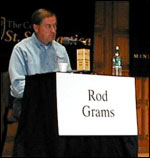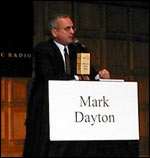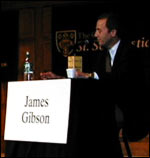Environmental Issues Lead Senate Debate
By Amy Radil
October 16, 2000
Minnesota's three major U.S. Senate candidates held a debate in Duluth Sunday, answering questions posed by an audience at the College of St. Scholastica. In the first debate outside the Twin Cities, Republican incumbent Rod Grams, DFL candidate Mark Dayton and Independence Party candidate James Gibson squared off on issues that haven't gotten much attention in the campaign, dealing with the environment and the use of federal lands.
FOR DULUTH AREA VOTERS, the local angle took center stage at the latest U.S. Senate debate, in the form of questions about logging, mining, the environment and access to wild places. Incumbent Republican Senator Rod Grams honed the image he has cultivated in his first term as senator, of being the common person's advocate against federal restrictions on public land use. Grams criticized the Clinton Administration for decreasing logging in national forests. He also pointed out his role in channeling funding to northeast Minnesota after last year's blowdown, and said he'll continue to push for fewer restrictions in managing Voyageurs National Park. Grams says park managers have lost touch with the needs of local people.
"The park over the years has continued to put more and more restrictions - whether it's on houseboats or water planes or whatever it might be - but continuing to put up road blocks for area residents and any resident from Minnesota or anywhere around the country to be able to come in and at least use or enjoy the park," Grams said.
Grams said his DFL opponent, Mark Dayton, would not represent the logging industry as effectively as he would, since Dayton has been endorsed by the Sierra Club which wants to cut logging on public lands. But Dayton called that assessment "a smear" and said he disagrees with the Sierra Club's stance.
Dayton said the U.S. Forest Service has become too restrictive in its logging regulations, and said if elected he'd work to expand logging in the state.
"We need strong and aggressive utilization of our wood products on public lands which are the vast majority of northern Minnesota forest opportunities, as well as private lands," Dayton said.
Dayton, a former state director of economic development, also said national parks, such as Voyageurs, should be an economic boon to surrounding areas. He also added that he opposes restrictions on snowmobiling or private houseboats in the park.
Meanwhile, Independence Party candidate James Gibson, who has made protecting the environment a plank in his platform, told the audience he didn't know enough to comment on the issues of logging or national parks.
"This is another issue that I have to admit I'm simply not up to speed on, I'd like to get up here more. I'll learn more about these issues, but I'm not prepared to comment," said Gibson.
Several students in the audience said they found Gibson's honesty refreshing. "Gibson seems to need to study up on some things but at least he was willing to admit it," said Penny Davis, who attends the University of Minnesota-Duluth. "Dayton needs to quit interrupting people. That was just our, my first impression. Grams seemed to know what he's talking about, I don't agree with everything he says, but he seemed to do a really good job of presenting himself."
The tone of Sunday's debate was sharp, with both Grams and Gibson launching most of their criticisms at Dayton. Dayton fought back, saying Grams' fundraising from political action committees means he'll be swayed by special interests. Grams responded that Dayton, by not accepting contributions and funding his campaign from his own fortune, won't be accountable to voters.
Hear archived audio of the debate in Duluth. Hour One (Listen)
Hour Two (Listen)
By Amy Radil
October 16, 2000
|
|
RealAudio |
| |
|
|
|
||
FOR DULUTH AREA VOTERS, the local angle took center stage at the latest U.S. Senate debate, in the form of questions about logging, mining, the environment and access to wild places. Incumbent Republican Senator Rod Grams honed the image he has cultivated in his first term as senator, of being the common person's advocate against federal restrictions on public land use. Grams criticized the Clinton Administration for decreasing logging in national forests. He also pointed out his role in channeling funding to northeast Minnesota after last year's blowdown, and said he'll continue to push for fewer restrictions in managing Voyageurs National Park. Grams says park managers have lost touch with the needs of local people.
"The park over the years has continued to put more and more restrictions - whether it's on houseboats or water planes or whatever it might be - but continuing to put up road blocks for area residents and any resident from Minnesota or anywhere around the country to be able to come in and at least use or enjoy the park," Grams said.
| |
|
|
|
||
Dayton said the U.S. Forest Service has become too restrictive in its logging regulations, and said if elected he'd work to expand logging in the state.
"We need strong and aggressive utilization of our wood products on public lands which are the vast majority of northern Minnesota forest opportunities, as well as private lands," Dayton said.
Dayton, a former state director of economic development, also said national parks, such as Voyageurs, should be an economic boon to surrounding areas. He also added that he opposes restrictions on snowmobiling or private houseboats in the park.
Meanwhile, Independence Party candidate James Gibson, who has made protecting the environment a plank in his platform, told the audience he didn't know enough to comment on the issues of logging or national parks.
"This is another issue that I have to admit I'm simply not up to speed on, I'd like to get up here more. I'll learn more about these issues, but I'm not prepared to comment," said Gibson.
| |
|
|
|
||
Several students in the audience said they found Gibson's honesty refreshing. "Gibson seems to need to study up on some things but at least he was willing to admit it," said Penny Davis, who attends the University of Minnesota-Duluth. "Dayton needs to quit interrupting people. That was just our, my first impression. Grams seemed to know what he's talking about, I don't agree with everything he says, but he seemed to do a really good job of presenting himself."
The tone of Sunday's debate was sharp, with both Grams and Gibson launching most of their criticisms at Dayton. Dayton fought back, saying Grams' fundraising from political action committees means he'll be swayed by special interests. Grams responded that Dayton, by not accepting contributions and funding his campaign from his own fortune, won't be accountable to voters.
Hear archived audio of the debate in Duluth. Hour One (Listen)
Hour Two (Listen)



